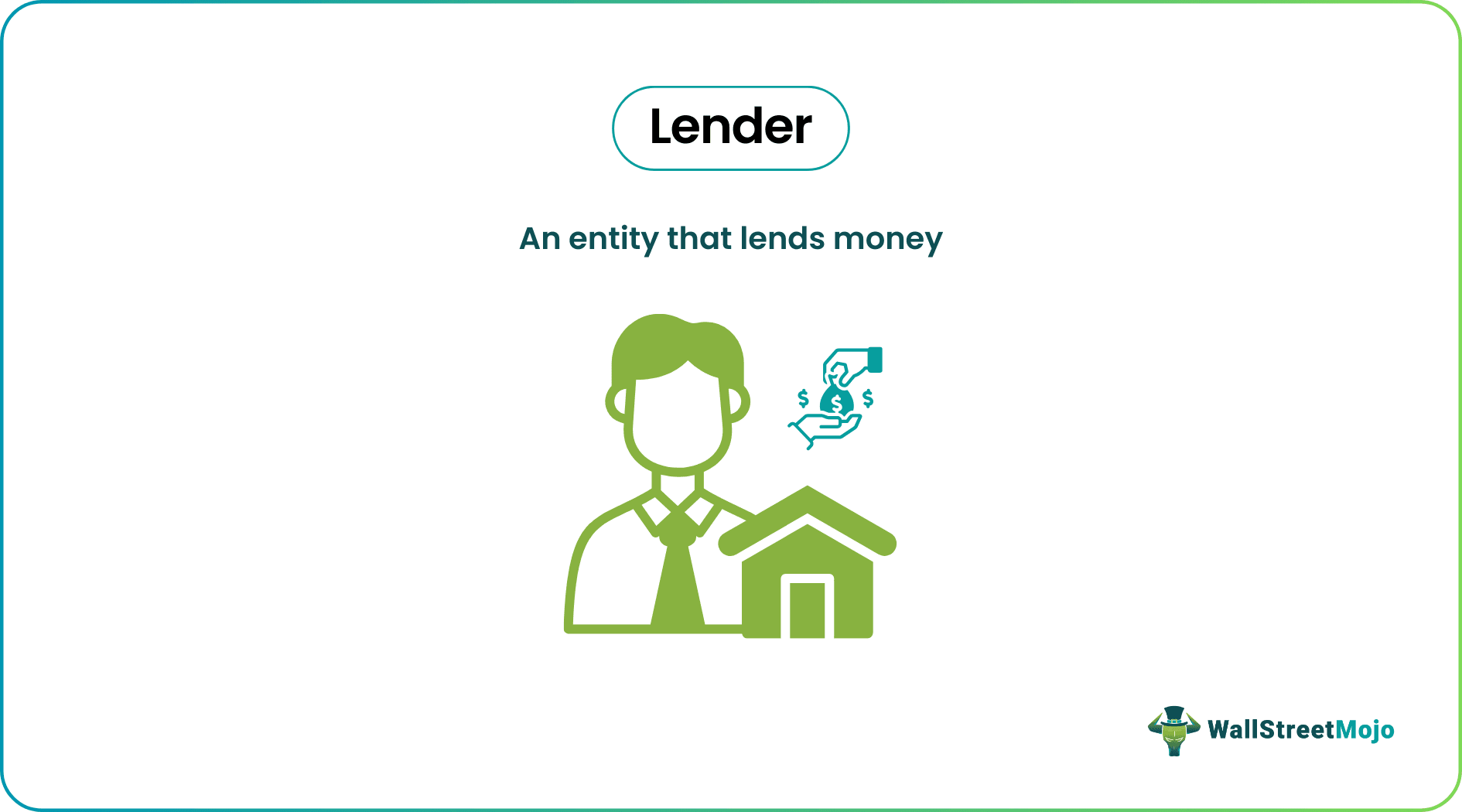Table Of Contents
Lender Meaning
A lender is a person, firm, or any other entity that lends money to people or businesses. In other words, they are entities offering loans. The borrower repays the borrowed money and interest in accordance with the loan repayment schedule.

The lending institution or entity can be of diverse types and offer different loan products to its customers. For example, hard money lenders offer hard money loans accepting assets or properties as collateral. Another example is the payday loan direct lenders managing every aspect of the payday loan process from start to end.
Key Takeaways
- A lender refers to an entity that lends money. Lending activity primarily contains two parties: the lending entity who lends the money and the borrower who receives it.
- The borrower repays the borrowed money and interest per the loan repayment schedule.
- If a default on a loan payment occurs, the lending entity has the right to seize the collateral provided during the loan approval process.
- It is generally classified into traditional and alternative types.
- Personal loans, auto loans, student loans, mortgage loans, and payday loans are loans offered by lending entities.
Lender Explained
Lenders are an important element in the financial market and play an important role in the economy. People want money to buy things, start a business, invest, etc. If they have insufficient funds, they can purchase loans. Individuals, small firms, corporations, etc., can face situations that result in availing of loans. Thus lenders offer different types of loan products and can customize loan offerings. Every loan, irrespective of its size and nature, primarily has two parties involved. One is the lending entity that offers money and the borrower who receives the loan.
Lenders fall in the category of creditors. Banks, credit unions, and peer-to-peer (P2P) lending are common examples. They engage in lending activities based on the standards set. They typically charge interest from the borrowers, an earning they make from the lending activity. Without the interest rate, a lending institution's source of earning is reduced in such activities. Commonly if a person takes a loan from a friend or relative, the person may not have to deal with an interest rate.
Entities can offer zero-interest loans, where only the principal sum needs to be repaid, given the borrower strictly follows the deadlines set. A loan with a below-market interest rate is referred to as a soft loan or soft funding. Also, such loans may exhibit extended repayment terms or interest holidays.
Types Of Lenders
Generally, it is classified into traditional and alternative. Let's look into its brief explanation:
1. Traditional Lenders
It comprises old forms of lending, where lenders are generally banks and other financial institutions. It includes the lending firms that cover all types of loans, from personal to corporate, small to big loans.
All lending occurs in a secure manner where the debt comes with an obligation to repay principal with interest; if the borrower defaults, it gives full authority to a lender to seize possession of the borrower's assets. Moreover, banks as lenders tend to offer customized loans and regulated interest rates to ensure people take loans and make it easier for them to repay on time.
2. Alternative Lenders
They are the providers of alternative lending. They function like a bank to offer loans. In its simplest form, they deal with business loans made obtainable beyond the traditional banking system. Examples include P2P (Peer-to-Peer) Lenders, crowdfunding, marketplace lending, and fintech. The alternatives enjoy relaxation from government authorities as they are not part of the traditional group; there are several types of regulations that they are not entitled to follow.
These loans can be secured or unsecured, but alternative entities face more risk with unsecured loan activities. They often charge a high-interest rate and easily work without collateral. Such creditors majorly offer short-term and small amounts of credit and may ask for documentation, business plan papers, and employment proof if a person needs a hefty loan.
Examples
Let's look into some examples for a better understanding of the concept:
Example #1
Nathan wants to buy a house but doesn't have the required amount. So Nathan visits a bank and applies for a home mortgage. After evaluation and other procedures bank approved the mortgage. The house he wants to buy is for $300,000. Typically, to buy a house, 20% of the whole amount is in cash as a down payment, and the left amount is financed through the bank. The manager explains that for a $240,000 loan, the bank will charge him an interest rate of 4.5% for ten years. In this case, the bank is the mortgage lender, and Nathan is the borrower.
Example #2
There are credit unions with operations ranging from small lending to multi-state operations. More than 5,100 credit unions in the United States are federally insured. They offer a wide range of financial services, similar to banks, and a significant portion of their offering contains mortgages. Generally, the individual must be a credit union member to apply for a mortgage loan. Furthermore, credit unions may be a better choice due to their individualized service and member-only offers.
